“Why is there a black chicken following you?”
*Peep* *peep*
“Oh, that egg we saved ten hours ago hatched, and now it thinks I’m its mom!”
*Peep* *peep*
“Do you think having a void chicken around is a good idea?”
*Peep* *peep*
“Oh, definitely not, it slaughtered the other chickens.”
*Peep* *peep*
“Maybe we should kill it then?“
*Peep* *peep*
“Noooo, it’s so cute.”
*Peep* *peep*
“Will it keep chirping like this from now on?”
*Peep* *peep*
“Yes, it seems like it.”
*Peep* *peep*
For busy people, here is the gist of this review: the game is amazing, stop browsing the internet, go and buy it. Now.
For people who are bored at work, here is the long version.
Divinity: Original Sin 2 is the latest installment of the Divinity franchise, at least as of now. The series consists of relatively unknown yet successful RPGs all taking place in the same universe.
The timeline of these games is anyone’s guess at this point, let me illustrate this by listing out the games in chronological order and marking their publishing year in parenthesis:
- Divinity: Dragon Commander (2013)
- Divinity: Original Sin (2014)
- Divine Divinity (2002)
- Beyond Divinity (2004)
- Divinity: Original Sin 2 (2017)
- Divinity 2 (2009)
I haven’t played all of these games, but I definitely didn’t pick up on the timeline of the ones I did play. I got a vague sense that this is all in the same world due to the name of the continent, the main factions, and the magic system terminology. However, this doesn’t ruin your experience, you don’t have to know anything about the world to enjoy Divinity: Original Sin 2.
At the beginning of the story, the world is in a bit of chaos, but not too bad. The mysterious ultimate source of magic, aptly named the Source, allegedly attracts Voidwoken, beasts of the void. So the Divine Order, a religious military organization which we all know usually is the pinnacle of goodness, does the only sensible thing, rounds up all the Sourcerers, and locks them up in the ironically named Fort Joy. This is where the player steps into the story and takes on the mantle of a Sourcerer in chains on a ship, bound to Fort Joy.
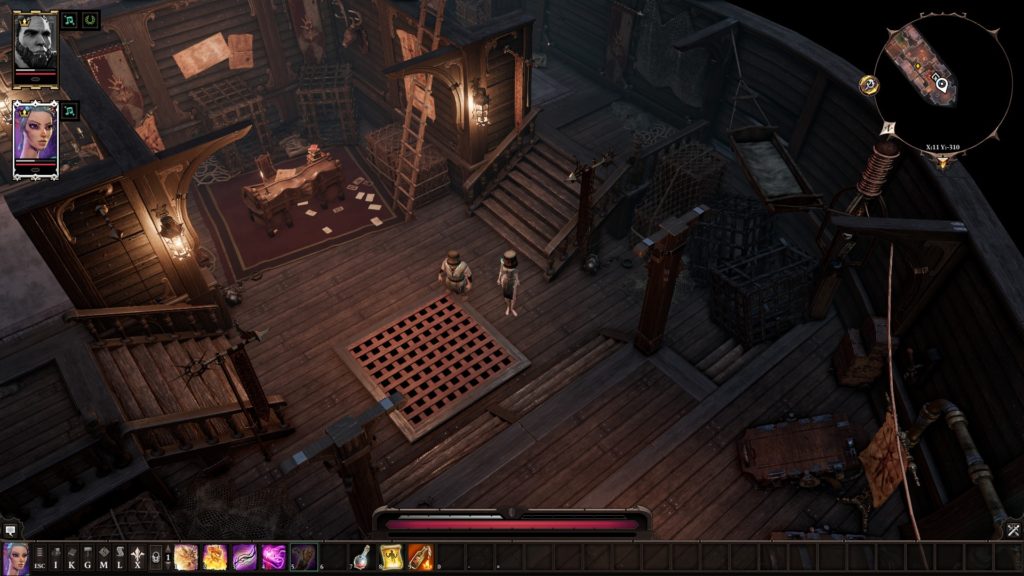
The gameplay has two main aspects: interacting with the world (which includes lots of talking, reading, exploring), and turn-based tactical combat (which includes lots of explosions).
Divinity Original Sin 2 is an RPG, so naturally, there has to be stats that you can level up, an inventory, personal quests, perks, tags, etc. It is impossible to describe every mechanic of the game, but if you can think of a random RPG concept, this game probably has it.
The Good
This list is going to be long, I am still mind-blown by how great this game is.
Let’s start with the most important thing in an RPG: the talent system. It is great, probably one of the best ones out there. You are totally free to combine any class with any other class. It is sort of what Grim Dawn was going for, but here it actually works. You need to put talent points into a specific class, like Hunter or Aerotheurge (lightning mage) which allows you to learn skill books relating to that class. Higher-level skills require more points allocated to that class, which makes sense. The interesting thing is that the points also give you passive skills which allow for weird synergies. For example, one of us played as a rogue, so scoundrel was a natural main class to choose for backstabbing and daggers, and the secondary class was interestingly necromancer because it gives you life steal and horrific summons. So in this game, you can have a dual-dagger-wielding rogue who summons huge bone spiders and this combo is completely valid and makes sense. We also had an archer who could do earth magic, a water-lightning mage, and a warrior who could turn enemies into chickens.
Secondly, the greatest achievement of this franchise is freedom. Everything is really, really flexible. You can sneak, teleport anything (objects, heroes, or NPCs), carry deathfog barrels in your backpack that can instakill almost anything, and just do really wild combos in general. The story can also progress in a lot of different ways. You might accidentally help someone out who in turn feels indebted to you and therefore shows you a secret passage. Or you might have found a red ball that can distract some hounds so you can slip by. Or you might have met a friend of those evil hounds and dropping his name will gain you their friendship. Or you might just kill everyone on the map and progress that way. It is really up to you. And this unshackled freedom is absolutely unmatched by any other game. The closest you get to the Divinity Original Sin experience is a pen and paper D&D campaign.
The world also reacts differently to different heroes. Some elves are racists towards dwarves, so you should get your elf to talk to them. Some people have a past with specific characters so their interactions unlock new dialogue options. Or based on your character tags such as mystic or noble you might open new story options.
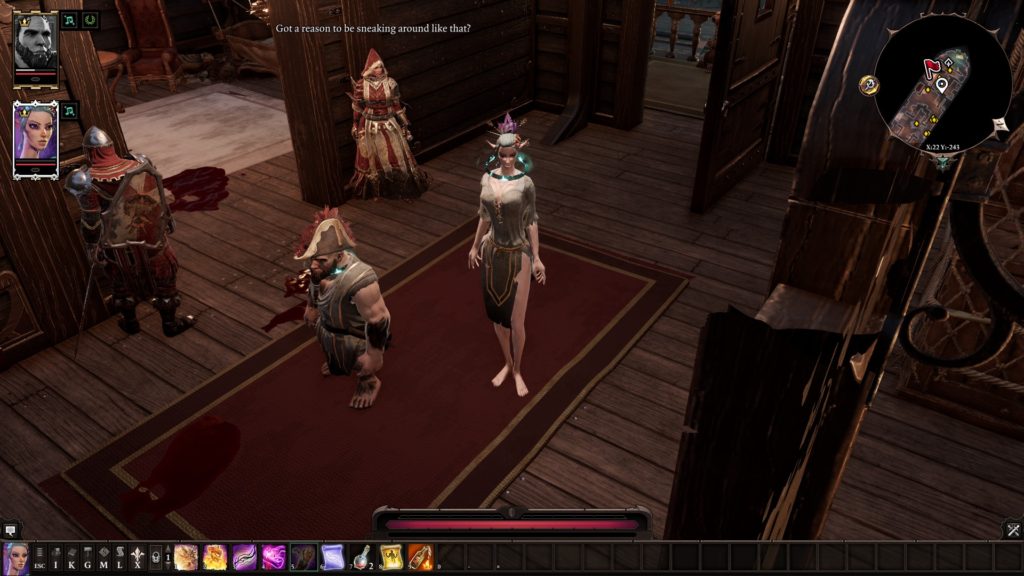
The game is so free that sometimes our solutions felt a bit like cheating. We have a really good system for getting skillbooks which we developed during our playthrough of Divinity Original Sin 1. You get one of your characters to talk to the merchant, another one pickpockets the skillbooks, and then gives them to whoever needs them, then that hero quickly learns the skills, which makes the books disappear. Finally, the first character lets go of the merchant, who realizes that he/she has been robbed and starts searching everyone around them, but since the skillbooks disappear after being read they find nothing. Unless they are racist towards lizards – one time an NPC got angry at our lizard even though there was nothing suspicious in his inventory.
Even the final boss is a puzzle that you can solve in multiple ways. Without spoiling much, the fight is nigh impossible, and there are two factions involved beating on each other and your party, so our solution was to let everyone die, have the rogue become invisible, wait until one of the factions is wiped out, and then resurrect the rest of the party. It should feel like cheating but it felt epic. It was very fitting for the rogue to pull this move and felt great when we could take our vengeance once resurrected.
The combat also follows the same principle which is “if you can think of it, you can probably do it”. You can teleport big monsters on top of ladders because they can’t climb down, you can combine healing and decay for easy kills, combine surface elements, like blowing up poison or electrocuting water. One of our favorite move was using ruptured tendons, which causes damage while moving, and then turning that enemy into a chicken, which makes them run around like, well, a headless chicken, bleeding all over the place.
The difficulty level of combat is extremely well-tuned, I honestly thought the enemies were leveling with us, but after googling it, it turns out they are not, the game is just so well designed. This is something we have mentioned a lot in previous reviews, the right level of difficulty makes you care about talenting and gear and combos. We never would have spent time coming up with ingenious skill combos if every enemy could be one-shot by a run-of-the-mill lightning bolt. We actually started checking each enemy during combat, looking at their immunities and resistances, which is very rare for us. The last time I cared about what resistances of an enemy has was in Diablo II. And Dark Souls.
On top of the great difficulty level, most of the fights are pretty unique. There are some recurring enemies but most of them are one-timers. A lot of the fights also have little tricks, like evil little puppets draining your source, or lizards reviving on cursed fire.
Every skill in combat is flashy and sensational. In every fight, we had “you can do what now?” and “you can do how much damage from high ground now?” moments. Somehow our characters felt incredibly powerful but at the same time, each fight was a challenge. The game is perfectly balanced, as all things should be.
So far all this was on simple game mechanics but an RPG needs a good story, and luckily for us, Divinity Original Sin 2 does not disappoint. The overall story is epic, grande, but also very clear and understandable. You do not feel lost for a second, I am looking at you, Grim Dawn. It also has twists and moral choices, you also get cool quirky side quests, and meaningful personal quests that impact the main story. For example, if you have the assassin guy in your party you can approach some adversaries differently which merits a whole different tactic for getting out of that situation. Even the little side quests are well written and memorable, you get moments when you realize that oh my god this is the name of the dead cat of that kid we rescued ten hours ago. And most of the quests are all interconnected somehow which feels incredible while playing. You sneak into a random house and find a letter that ties the owner back to the events in a previous place and you realize all of it fits together. The whole game is a giant web of stories and it feels amazing when you connect the dots.
We even read the in-game books. Most of them. I think that is the biggest praise I can give to an RPG. I read most of the in-game books and letters and journals.
We each had a main hero and a companion so we got to experience their stories very, well, intimately. Not surprisingly they were so well written, outright emotional at places. The game lets you build your relationship however you want it or however you accidentally end up doing it. Are you a brave little dwarf, stuck aboard a ship chatting with you lizard friend while the rest of the party is below decks doing godwoken-knows what? Are you contemplating how your friendship with the huge lizard might blossom into something more…? Give it a go! Just don’t be surprised when you try to break up with the aforementioned huge lizard and he says he is not a one-night stand and then proceeds to aggressively kiss you in front of everyone so now apparently the two of you are together.
Then there is the narration. Some people might be put off by this, but in Divinity Original Sin 2 the characters don’t do much during dialogue scenes. They just stand there and every other aspect is described by the narrator, such as they moved closed or they put a blade to your throat. If you can get past this mechanic, the narrative really opens up. And you should get past it, the narrator is really good. This aspect of the game really feels like a pen and paper RPG.
Even the humor is spot on, it is charming and not referential, it is more like classic absurd in its own right. Even some of the books you can read are funny. I genuinely had a good time skimming through them.
There are tons of little memorable elements that really elevate the game. For example, one time we rescued a little chicken egg from some Voidwokens and we did not suspect how far that quest will lead.
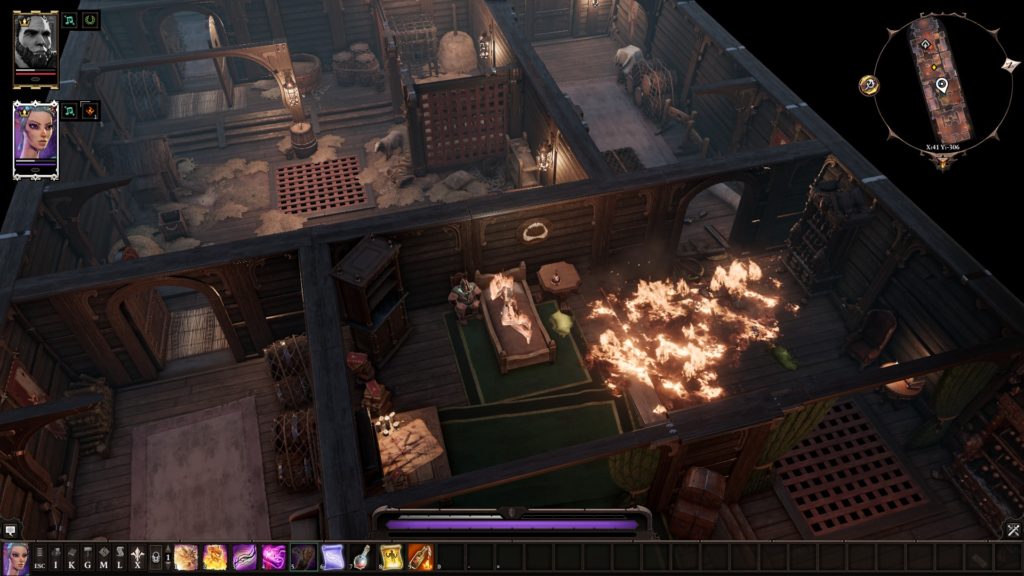
The game also looks great, the map designs and visuals are generally good. The music is also better than most games, although not as genius as the previous Divinity games, because sadly the original composer, Kirill Pokrovsky, unexpectedly died. The music is also customizable, you can choose your prevalent instrument during character creation so you get awesome little musical shout-outs to your character when you land a kill.
Interesting fact, you only gain 20 or so levels throughout the game, which feels record low for a 100-hour game.
Lastly, all this freedom comes at a price. The game does not hold your hand, you might stumble upon some stuff and you might not. So in the end you won’t find everything, which will hurt some completionists to the core, but then again, when you do find something, you genuinely feel excited about it and there seems to be enough secrets that you are bound to find lots of them.
The Bad
To be honest this game only has one serious flaw: our main characters don’t talk or interact in the game. You have this beautiful side story with your companion, a strong friendship or love, or the mix of the two, but it feels like we are two separate groups that band together by necessity. Even our attitude towards each other was 0, while my handsome rugged assassin’s attitude towards me was 100.
Maybe the developers thought that we are supposed to do the talking IRL, but it is not the same. The lack of interaction is a huge missed opportunity compared to Divinity Original Sin 1, where the two main heroes constantly talked about their feelings and even had to resort to rock-paper-scissors to break up arguments. In Original Sin 2 sometimes you get group votes at important story points but in the end, the person doing the dialogue decides what to do and nobody can contend that. I also really miss getting perks based on our dialogues, like uuuh, someone likes money, here is a materialist perk based on your conversation. That was a genius game mechanic in Original Sin 1.
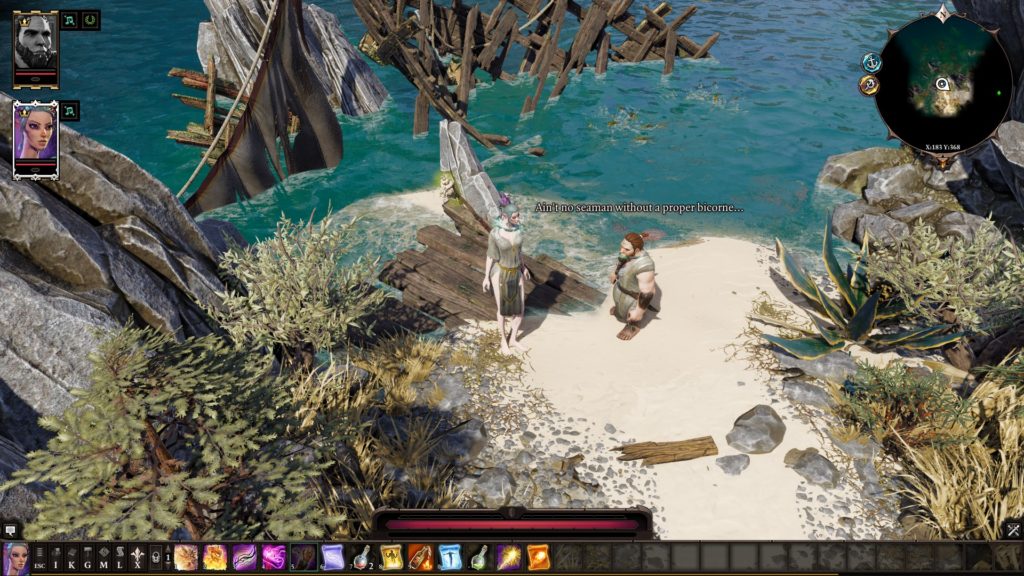
Okay, now that I am done with my only deep-seated disappointment, let’s look at the nitpicky stuff.
I honestly don’t understand who the target audience is for this game, good luck finding three people with whom you can play this 100-hour epic. Maybe if you have three siblings all really close in age, or live in a polyamorous situation. Anyway, if you do get all the player slots filled I doubt it will be fun. The wait times during combat would be atrocious, you would spend most of the game listening to other player’s dialogues, and as a fast, funny, team-based RPG experience, the game fails miserably because it is just not that. Imagine having a person who likes to explore everything meticulously in your party along with someone with an attention span of a toddler. It is very easy to screw up the game for others by accidentally triggering mass battles that kill all the NPCs and therefore missing out on huge chunks of the story. But if it doesn’t work as a four-player game, why didn’t they make it a proper two-player one?
Combat can get a bit hectic and occasionally people might get frustrated over line of sight, how on earth did that pool of blood get electrocuted, how did that healing spell not reach you, etc. Also, everything tends to explode after a while, even if none of us does any fire damage.
The AI is not very smart, enemies sometimes walk into fire or do some really stupid move. If there is deathfog ANYWHERE NEAR you, be prepared with a resurrection scroll because there is no way you can stop your companions before they merrily stroll into it.
We established that the story is good, but the game world is really really dark. I can’t mention a genuinely good character, and likewise, the bad guys tend to have their reasons, in fact, I am still confused about the final boss fight, so were they bad, or were we the bad guys all along? The dark tone is generally fine, but sometimes it goes a bit too far. For example, we were traversing a lush forest and stumbled upon a dead bear, and then later found a cub. Then the cub goes to the body and starts crying, and there is nothing we can do about it, no quest to resurrect mama bear, but then why is it there? I noticed the torture porn dungeon we climbed out of a couple of minutes ago, game, I don’t need this. This unsolvable depressing content without any emotional context is a bit misplaced.
Lastly, we played the definitive edition, but I generally don’t like it when a game has multiple versions out. It can be frustrating for players who plunged into the game when it came out to see a better version released later.
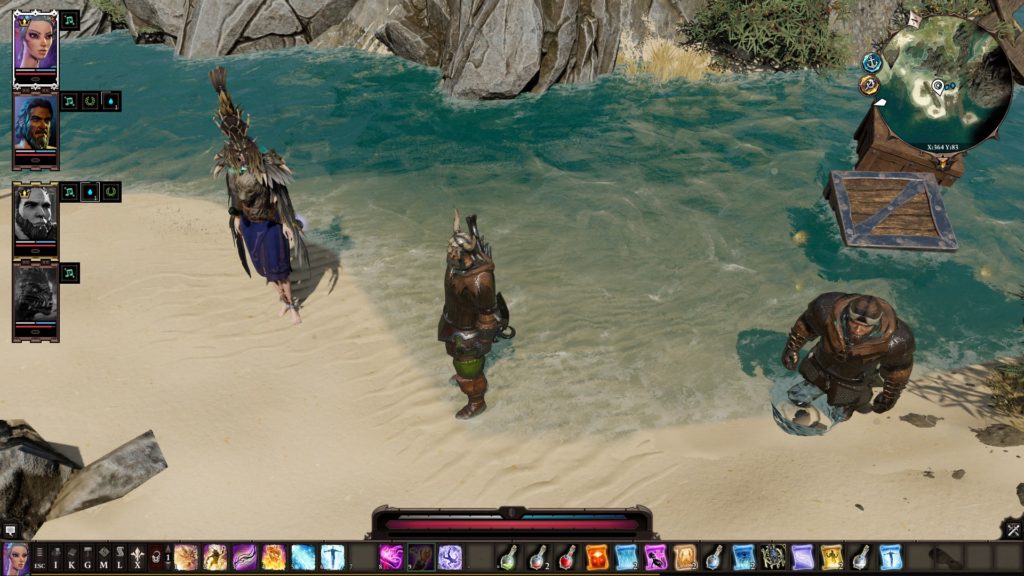
The Co-Op
Mechanically the co-op is great. The combat is awesome, we all share quests, you can listen in on other conversations, etc.
But when it comes to experiencing the story in co-op, not that much. Compared to the average co-op ARPG it is great, but I had really high expectations because of Original Sin 1 and this one is lacking. Our characters just didn’t communicate with each other, we were off gallivanting with our companions, being emotionally invested in their lives instead of each other. If we had four players we wouldn’t even have had that.
In the game, each character has their own god and has separate conversations with said god, hidden from the other players, which is a very cool mechanic. Who knows what that sneaky dwarf is planning with his stupid stunted god, the whole hidden traitor vibe is very cool. The ending is also great, a really unique concept.
The Recommendation
We played it in one go, over the course of ten days, it was an absolute ride. That is an average of nine hours per day of Divinity Original Sin 2, and it wasn’t boring for a second.
The game is obviously really long and complicated. From my point of view, everybody should be playing this game but I have to acknowledge the fact that not everybody gets as excited about talent systems as I do.
So, if playing through 100 hours of epic fantasy with a partner sounds like your type of thing, go and buy the game, it will not disappoint.
Info
| Release Year | 2017 |
| Genre | RPG, Tactical Combat |
| Difficulty | Hard |
| Number of Players | 1 to 4 |
| Length | 92 hours |
Rating
| Overall | Amazing |
| Story | Amazing |
| Co-Operation | Good |